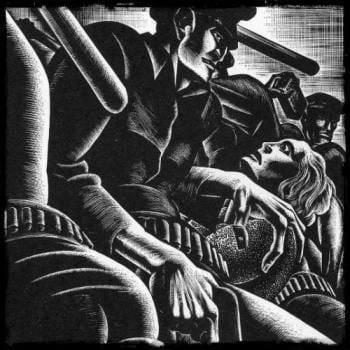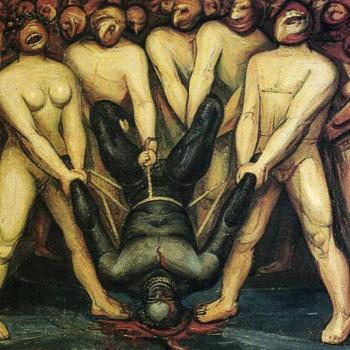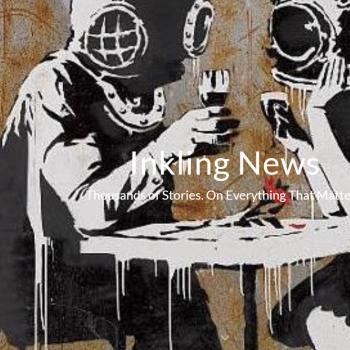There is a widely held (and somewhat depressing) view that most people are hedgehogs. We have One Big Idea (or, for many of us, perhaps only one little idea). At some point in our twenties, we experience a “conversion moment,” a singular epiphany about the ways of the world, which heralds some consolidation of our mature “self” and thereby opens the gates to our future.
From this perspective, everything else we do after that glorious moment pretty much involves a (mostly ruminative, sometimes angry) gnawing upon that same, tired bone. Depressing or no, I can well believe this is life’s defining pattern. Our identity is not who we say we are, it is what we say we believe, that core idea to which throughout our adult lives we somehow, inevitably find ourselves returning.
Conversion moments from the history of Christianity abound, of course. Consider St. Paul’s I was blind but now can see conversion moment, St. Augustine’s Take up and read moment, and Martin Luther’s Here I stand, I can do no other moment. In recent decades, one can name numerous converts to Catholicism whose reactionary political views consolidated around their newly found religious faith (for example, NY Post editor Sohrab Amari and Harvard Law School professor Adrian Vermeule, both of whom converted in 2016).
This hedgehog perspective on our progress through life has also become a staple of modern developmental psychology, perhaps most famously in the work of Erik Erikson, who associated ego consolidation and adulthood, generally, with the capacity to commit and be faithful – in one’s relationships, one’s work, and one’s values. But Erikson also wrote acclaimed, psychologically informed biographies of Martin Luther and Mahatma Gandhi, and perhaps the most enduring value of his work concerned his attunement to those beliefs and commitments that challenge historically rooted institutions and practices (such as the Catholic Church and the British Empire).
Trauma rooted in catastrophic, historically significant events can also trigger conversion moments. The “New Atheist” movement was a collection of intellectuals and ideas that consolidated around a rationalist critique of religion following the September 11, 2001 attacks on the World Trade Center (and other targets) by Islamist radicals associated with Al-Qaeda. Between 2004 and 2006, Sam Harris, Richard Dawkins, Christopher Hitchens, and Daniel Dennett published best-selling books that emphasized the profound irrationality and moral darkness of organized religion, with a particular emphasis on the primitive savagery of radical Islam.
The New Atheism’s impact has been decidedly mixed, and assessments of it have not been kind. For my purposes, however, the importance of the New Atheists is that they were responding to 9/11 and its aftermath – a quite specific set of circumstances in a quite specific moment in time – with universal claims about religion that not only did not stand up well to scrutiny, but that were also ahistorical exercises in persuasion and logic. In other words, each of these guys invoked their One Big Idea to explain and pass judgment on this specific set of events and outcomes (the proverbial hammer for which everything becomes a nail).
New Atheist arguments on behalf of scientific skepticism and reason and against blind faith and superstition have ultimately fallen short of the mark because they are insufficiently self-skeptical and, more significantly, because they are aiming at the wrong target.
As many critics have observed, the New Atheists (somewhat smugly) challenged religious institutions, practices, and ideas by making a series of epistemological claims about their “truth.” These “truthiness” arguments were the primary basis for the sweeping attacks about religion’s irrational and morally regressive instincts.
Unforunately, facts and logic rarely adjudicate truth claims,s which are more generally grounded in feeling states. And logic is a realm most people care to visit about as much as their in-laws. What therefore ensued was a lot of shouting, not much conversation, and no persuasion. In the end, New Atheist occupation of a moral high ground on the basis of their truth claims made them seem not unlike the religions they were trying to sweep into the dustbin of history.
Fifteen years out, the New Atheists (somewhat annoyingly) remain much in the news, their media-savvy ideas and personas an ongoing third rail for any serious conversation about science, religion, and the “clash of civilizations.” It is an unfortunate, but unavoidable, reality that these guys continue to supply the standard template for catstrophizing, cosmologizing, “extinction moment,” philosophical speculation of the sort in which I’m engaged.
We can agree that New Atheist ideas about science and religion have not aged particularly well. The question still remains, what changed so dramatically after 2004 to make these ideas about science and religion largely irrelevant, yet still a limit on other conversations about these competing cosmologies? My belief is that the New Atheist guys did not anticipate emerging challenges to both religious and scientific cosmologies that resulted from the impacts of globalization, climate change, and what some call the technology singularity.
The conversation (or lack thereof) between religious and science cosmologies has rested on classical assumptions – about agency, selfhood, language, truth, and causation – that are suddenly less relevant to how we think about the future than at any point since at least World War II. What recent global shocks have more fully disclosed – but that we generally still fail to perceive, particularly in the liberal democratic “center” – is that the arguments between the New Atheists and their religious enemies, contentious though they may have been and continue to be, could not take place at all without a shared set of understandings about the terms of engagement.
As one might expect from a clash between theists and atheists, the engagement was symmetric, a battle of the hedgehogs. Consider, those famously fratricidal brothers Peter and Christopher Hitchens, who published dueling books on behalf of theism and atheism within a few years of each other, brother Peter writing in his book that “On this my brother and I agree: that independence of mind is immensely precious, and that we should try to tell the truth in clear English even if we are disliked for doing so.”
More next time … about the “agency, selfhood, language, truth, and causation” part.
If you enjoy reading Creation Project posts on Patheos, consider also subscribing to the free Creation Project newsletter on Substack!











